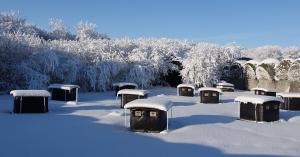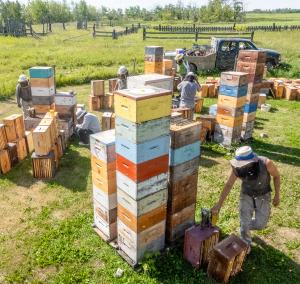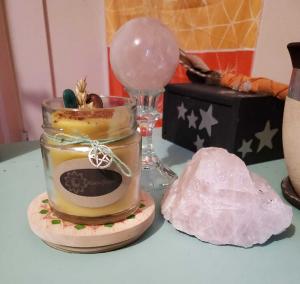
Permanent bee yards and outdoor wintering cuts down on fossil fuel and electricity consumption and is healthier for the bees
With organic certification normally impossible, and North American honeybee mortality continuing to rise, the importance of “sustainable beekeeping” increases.
— Nathan Wendell, Managing Partner, Wendell Honey
MACNUTT, SK, CANADA, October 3, 2023 /EINPresswire.com/ — Ever-increasing honeybee colony mortality in North America has made sustainability hot topic in the beekeeping industry. In addition to environmental sustainability in which beekeepers respect the local environment, endeavoring to minimize negative environmental effects of beekeeping, now the sustainability of the beekeeping industry itself is at risk. 48% of American honeybee colonies died during year ending April 1, 2023 while 2021-22 was the worst year on record for winter honeybee mortality in Canada.
The organic food movement is a significant step towards sustainable agriculture, promoting environmentally friendly practices and respect for nature. Since organic certification is complex for honey and unattainable for most North American honey producers, this article will focus on the natural and sustainable beekeeping practices, using Wendell Honey Farm as an example of a commercial honey producer that employs many sustainable beekeeping practices. Despite being unable to obtain organic certification due to its location near commercial grain agriculture, Wendell Honey Farm is dedicated to maintaining sustainable and eco-friendly beekeeping operations, while prioritizing honeybee health to support the continuance of beekeeping as a viable industry for the future.
Queen Rearing Program
Like most Western Canadian honey farms, Wendell Honey Farm faced a major challenge in the 1980s when the American border closed to Canadian imports of honeybees due to diseases not prevalent in Canada. To adapt, the farm began keeping hives over winter instead of euthanizing colonies in autumn and importing bees in the spring. Tim Wendell initiated a queen rearing program to raise bees that have a history of honey production, are resistant to diseases, and are well adapted to Canadian the local environment and climate. Today, the program, led by Zulema Castillo, a veterinarian doctor specializing in honeybees and queens, and Dan Margarit, with 40 years expertise at beekeeping and raising queens, has made Wendell Honey self-sufficient in raising their queen stock. Honeybee stock selectively bred over generations has resulted in well-adapted, healthy honeybees that can survive the harsh Canadian winters.
Non-Chemical, Minimally Invasive Harvesting
Eschewing commonly used chemical boards to repel bees during harvest, Wendell Honey Farm opts for a non-disruptive, non-chemical approach. Wendell Honey uses queen excluders in its beehives to confine the queen and her brood to the bottom hive and second box of honeycomb frames, termed the “brood chamber”. A queen excluder is simply a flat screen that allows the smaller worker bees, but not the larger queen bee, to pass through. Honey supers (wooden boxes with frames of empty honeycomb) are stacked on top of the brood chamber for harvest-able honey. Using excluders allows the honey supers to be removed during harvest without disrupting the brood chamber. In the morning the beekeepers gently set the full honey supers down beside the hives. When the team returns in the afternoon, most of the worker bees in the honey supers have flown out to forage and then returned to the original hive. The few remaining bees are gently and harmlessly blown out using forced air blowers. A testament to the non-disruptive nature of this method is the fact that the beekeepers can often work topless and in shorts, while the bees simply carry on with their business.
Pest Control
To protect the hives from potential natural threats such as bears and skunks, Wendell Honey employs solar-powered electric fences around every bee yard. These fences effectively deter predators without harming the animals, thus promoting coexistence with local wildlife.
Ground Foliage Control
Wendell Honey Farm prioritizes airflow through the hives for honeybee colony health. To prevent tall grass from obstructing hive entrances and restricting airflow, beekeepers regularly mow the grass around the 100+ apiaries throughout the summer. Avoiding the use of herbicides ensures an eco-friendly approach to maintaining the apiaries.
Beehive Equipment
Wendell Honey primarily uses wooden and wax beehive equipment, favoring these natural and biodegradable materials over cheaper plastic alternatives. Wooden honey supers and frames are long-lasting and repairable, reducing waste and promoting a more durable and eco-friendly beekeeping operation. Rather than painting the honey supers and hives to protect them against the outdoor elements, Wendell Honey now dips the raw wooden hive equipment in beeswax, which provides a natural protection devoid of toxic chemicals.
Stationary Apiaries
Unlike many beekeeping operations that move beehives for pollination or seeking more blossoms, Wendell Honey Farm keeps its hives in one location throughout the year. This approach reduces fossil fuel consumption associated with frequent hive transportation and avoids the significant electricity usage of indoor wintering. Moving bee colonies does place a certain stress on the colony. When compared with colonies that move frequently to pollinate crops, stationary apiaries have lower risks of contracting infectious diseases, due to reduced contact with bees from other areas. Keeping the beehives in one place is both healthier for the bees and better for the environment.
Retail Packaging
Wendell Estate Honey uses premium glass jars for most of our retail honey sizes. These high-quality jars are perfect for re-using or up-cycling. They are also easily recyclable. For the largest 1kg (2.2lb) jar, after careful consideration, a PET (Polyethylene terephthalate) jar was chosen instead of glass. The light weight and ability to stack empty jars inside each other results in an over-all lower carbon footprint with PET jars when compared to similar glass jars, once all factors, including transportation, are considered. PET is one of the most easily recyclable plastics and can even be digested by certain bacteria. Wendell Estate Honey encourage everyone to recycle any PET plastic jars with their local recycling service.
Conclusion
Wendell Honey Farm’s dedication to sustainable practices has made it a leading example in environmentally friendly beekeeping practices. While organic certification is unattainable due to external factors, the farm’s commitment to promoting bee health and environmental stewardship stands as a testament to the potential for sustainable beekeeping. Through their efforts, they contribute to the preservation of honeybee colonies, the preservation of the environment, and, hopefully, the preservation of the industry.
Jeremy Wendell
Wendell Estate Honey
+1 204-564-2599
email us here
Visit us on social media:
Facebook
Twitter
Instagram
YouTube
![]()
- SEO Powered Content & PR Distribution. Get Amplified Today.
- PlatoData.Network Vertical Generative Ai. Empower Yourself. Access Here.
- PlatoAiStream. Web3 Intelligence. Knowledge Amplified. Access Here.
- PlatoESG. Carbon, CleanTech, Energy, Environment, Solar, Waste Management. Access Here.
- PlatoHealth. Biotech and Clinical Trials Intelligence. Access Here.
- Source: https://www.einpresswire.com/article/649753457/sustainable-beekeeping-practices-respect-the-environment-combat-increasing-honeybee-colony-mortality?ref=rss&code=ZI1NBxA85El_qpTo





